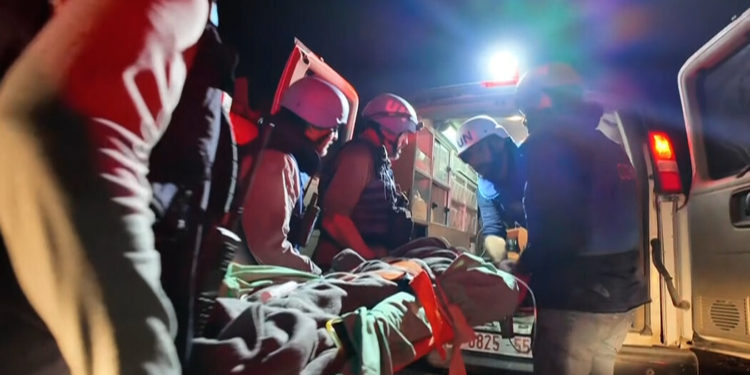By THE NEW YORK TIMES
An Israeli raid last week has reduced one of Gaza’s biggest hospitals to little more than a shelter for a small, terrified crew of patients and medical staff, while health officials warned on Monday that food and fuel supplies were almost gone at another hospital that has endured a nearly monthlong siege in the same city, Khan Younis.
Israel says it is rooting out Hamas activity at the medical centers, which it says Hamas has used to hide military operations — accusations it has made about multiple hospitals in Gaza, backing up some claims with evidence of Hamas tunnels. Hamas and health officials deny those charges, and aid groups have called on Israel to respect international laws protecting hospitals from attack.
It was not possible to verify statements made by either the Israeli military or the health ministry.
At Nasser Medical Complex, Gaza’s second-largest hospital, 14 patients were evacuated in a United Nations mission on Sunday, the World Health Organization said. The Palestine Red Crescent Society said 18 more were evacuated on Monday. The United Nations said negotiations were continuing for the Israeli military to allow the remaining patients — numbering more than 150, according to the World Health Organization — to be evacuated.
The exodus was prompted by a raid on Thursday by Israeli troops who entered the hospital and detained what Israel said was hundreds of people, including some it said had taken part in the Hamas-led Oct. 7 attack on Israel. Thousands of displaced Palestinians sheltering there evacuated before and during the raid.
Caring for the remaining patients are 15 health care workers, with no tap water, little food and oxygen, few medical supplies and no electricity except a backup generator that maintains some lifesaving equipment, the W.H.O. said. The W.H.O.’s director general, Tedros Adhanom Ghebreyesus, said on Sunday that Nasser was no longer functional.
The Gaza health ministry said that Israeli forces had arrested 70 medical personnel, including the director of surgery, and that eight patients had died at Nasser for lack of oxygen.
Israel has emphasized that it raided the hospital to stop Hamas activity. It said that, along with detaining the people it accused of participating in the Oct. 7 attack, it had discovered weapons in the medical complex and evidence tied to the attack.
The Red Crescent said on Monday that the situation at the other hospital in Khan Younis, Al-Amal, was “highly dangerous” after 28 days of siege, with food nearly exhausted and the fuel powering lifesaving equipment running low. It said the hospital had been attacked repeatedly and was shelled by Israeli forces on Sunday, and that Israeli troops had arrested 12 medical and administrative staff members.
A spokesman for the Israeli military referred a request for comment about Al-Amal to Israel’s agency overseeing relations with Gaza, which did not immediately comment.
On Monday, Nebal Farsakh, a spokeswoman for the Red Crescent, said the Israeli military had bombed the area around Al-Amal multiple times, damaging the hospital building and terrifying those inside. She said Israeli troops had shot at the hospital’s water desalination station, disabling it and leaving Al-Amal with less than three days’ supply of drinking water. About 180 people are inside, including patients, medical staff and displaced people, she said.
Video the Red Crescent posted on social media on Monday showed people in the group’s uniforms moving through the darkened hospital, using flashlights as they walked past beds in the hallways. In another video posted on Instagram on Sunday, a young man in medical scrubs described conditions at the hospital, saying Al-Amal had been under siege for so long that he had stopped counting.
“Our biggest dream is to just be able to stand by the windows. To see the sun, the streets. But, unfortunately, we can’t do that,” said the man, Saleem Aburas, whose Instagram account identifies him as a relief coordinator with the Red Crescent. “Because standing by the window means death. The occupation’s snipers are shooting at anything that moves inside the hospital.”
Eight times in a row, the Red Crescent said on Sunday, aid groups had asked Israeli forces for safe passage to deliver food, medical supplies, fuel and generator fuel to Al-Amal. Eight times, it said, they had failed to get that guarantee.
The state of the two hospitals was compounding an already dire situation for the territory’s health system, which the United Nations and aid groups have said is collapsing after Israel’s repeated attacks on hospitals.
Nada Rashwan and Ameera Harouda contributed reporting.







Discussion about this post